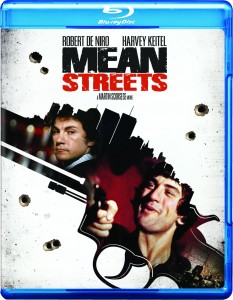 Released in 1973, this tough, poignant movie about a conflicted would-be gangster and his reckless friend propelled two virtually unknown actors and a mercurial director into the Hollywood spotlight. Martin Scorsese had two features under his belt before he directed Mean Streets: the independent film, Who’s That Knocking at My Door, and the Roger Corman produced B-movie, Boxcar Bertha. Scorsese showed the latter to his mentor, John Cassavettes, who basically called the movie crap. Cassavettes then challenged Scorsese to make something personal, something about the life he knew growing up in New York City. The idea for Mean Streets was born.
Released in 1973, this tough, poignant movie about a conflicted would-be gangster and his reckless friend propelled two virtually unknown actors and a mercurial director into the Hollywood spotlight. Martin Scorsese had two features under his belt before he directed Mean Streets: the independent film, Who’s That Knocking at My Door, and the Roger Corman produced B-movie, Boxcar Bertha. Scorsese showed the latter to his mentor, John Cassavettes, who basically called the movie crap. Cassavettes then challenged Scorsese to make something personal, something about the life he knew growing up in New York City. The idea for Mean Streets was born.
Scorsese wrote the script with Madrik Martin, a close friend of his from NYU (the two would later collaborate on New York, New York and Raging Bull). It drew from Scorsese’s life, in particular the conflict he felt as a practicing Catholic living in the very secular world of a Mafia-run New York City. When Jonathan Kaplan, the road manager for The Band, offered to fund half the movie, Scorsese got help from Corman to get the film made.
Scrosese put all of his guilt and shame into the character of Charlie, played by Harvey Keitel. Charlie is a low-level debt collector working for his uncle, a capo in the local mob. Charlie has a good heart and feels a sense of responsibility to take care of his friend, Johnny Boy, a young punk who gambles too much, borrows money he can’t repay, and lives his life on the edge. In case you haven’t figured it out, Johnny Boy is played by Robert DeNiro.
Charlie is also dating Johnny Boy’s cousin, Teresa (Amy Robinson), who suffers from epilepsy and is ostracized by an ignorant community because of her disorder. Charlie is conflicted by this relationship. He’s in love with Teresa, but fears that being with her will cause him to lose the respect of his powerful uncle and friends. While Charlie struggles to keep his religious beliefs in check and convince himself that he’s not that bad of a guy, Johnny Boy moves closer to oblivion.
DeNiro had the showier role in the movie. He struts around like a peacock, ready to show his feathers and kick the ass of anyone that even looks at him funny. Just about the only person who can knock any sense into him is Charlie. Keitel is tender when he has to be, volatile in other moments, but he’s DeNiro’s equal on screen. The only way to describe watching a 30-year-old DeNiro and a 32-year-old Keitel opposite each other is electric. My favorite moments in Mean Streets are those scenes when it’s just the two actors, walking the streets, goofing on each other, accurately depicting typical, directionless young men. The rapport DeNiro and Keitel share in Mean Streets is special.
Martin Scorsese uses many of the techniques he would eventually become famous for using: slow-mo tracking shots while some kick ass rock song underscores the scene (in this case, ”Street Fighting Man”); fluid, dynamic editing; a roving camera, and masterful direction of his actors.
Mean Streets is being released on Blu-ray for the first time. Considering that the supplemental material included on this Blu-ray release has appeared on previous DVD versions of the movie, I guess I would have thought that this, one of the most influential movies of the 1970’s, would have already had a Blu-ray available. Nevertheless, it’s great that the movie is now available and that the grainy film stock of Mean Streets has been given a fresh look.





Comments